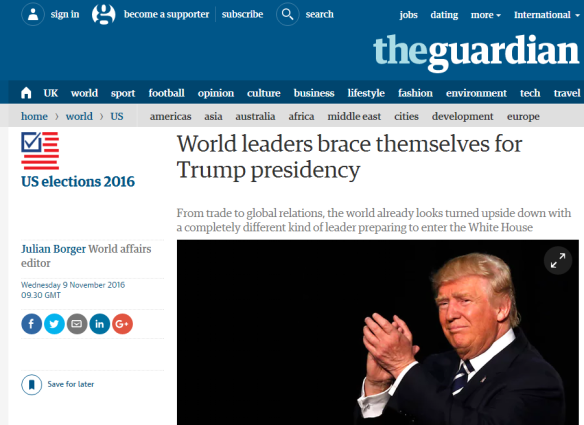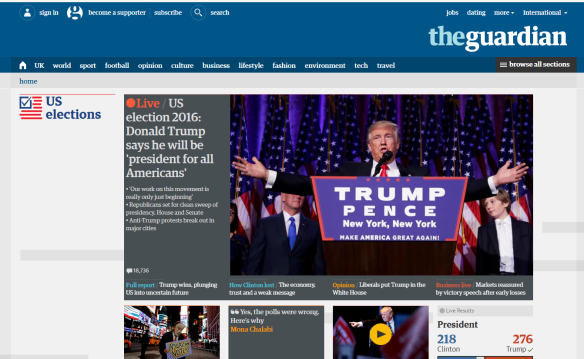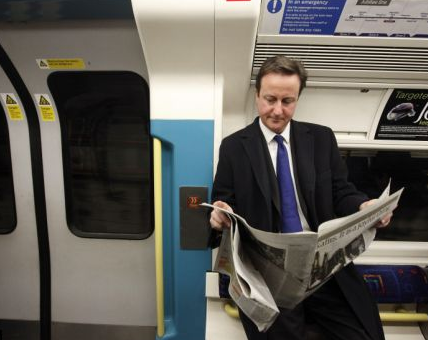
Brace harder.
Today, like many people across the world, I woke up this morning with a feeling of ‘what on earth just happened?’ Or, as they say here in Brussels: ‘Qu’est-ce qui le fuck se passe?’ Yes, we are living in the era of President Tr*mp.
A quick trawl through my Facebook newsfeed has revealed an outpouring of horror, shock and anger at the US election results. Here, for your perusal, is a representative selection:
“No way!!!!! Seriously?”
“Holy shit.”
“Ffs.”
“As if 23rd June 2016 wasn’t bad enough”
“As a woman I’m appalled. As a human I’m absolutely terrified.”
“As with Brexit, the electorate doesn’t always know what’s best for them”
So there you go. And while 9 November 2016 might seem like a grim day to many, we have of course been here before. Not that long ago. This summer, in fact. Here is a selection of my favourite Facebook statuses about Brexit, plucked once again from the annals of my newsfeed:
“Heartbroken.”
“Literally crying…. How could this happen???”
Etc.
I may also have bared my own shock, horror and anger in similar fashion, in the hope that someone out there in my select pool of FB friends (which more-or-less overlaps with my select pool of actual friends) would offer some ‘crumbs of comfort’.
And yet, and yet. While these examples are representative of my own social circle, there appears to be one political group of which they are NOT representative: the majority. Like it or not, 52% of voters voted in favour of Brexit, and the majority of US voters voted for Tr*mp. So where, you might say, are the jubilant Facebook statuses celebrating the results of these two recent exercises in democracy? They are nowhere to be seen, at least not on my newsfeed. This therefore means that the people with whom I associate do not constitute an accurate cross-section of society. I doubt that this is particularly unusual these days. But I think it is probably why I keep being so adversely surprised.
Political Silos
Back in June, my surprise stemmed from the fact that I personally knew no one who voted Brexit. I would discuss the referendum with friends, with family, with family-friends… None of them were going to support it. It was unthinkable. We kept reinforcing each other’s entrenched views, and by the time we got to June 2016 I couldn’t imagine how anyone could seriously contemplate voting for Brexit.
The obvious point is that my social circle was restricted entirely to people who generally held the same political views as me. Liberal, pro-EU, Labour voters, with a few Lib-Dems and Greens. No Tories, no UKIPers. My mistake, though, was in believing that these political views must surely constitute the majority viewpoint.
All the same, I was uncertain. There were moments in the dim and distant past (when the world was a much simpler place) when I began to doubt my place in the political mainstream. Most notably this happened after the 2015 UK general election.
I read articles about what a Tory government would do to the country. I read about the things they had wanted to do between 2010-2015, which the Lib-Dems had prevented in coalition. And yes, I read it all on the Guardian website, and on the BBC. Based on all this, it seemed inconceivable to me in 2015 that many people would vote for a Conservative government. It looked like we were heading for a hung parliament. All the polls seemed to think so.
Then the Conservative Party won an overall majority in the House of Commons, and was able to rule alone, unfettered by their former Lib-Dem coalition partners, and then we had an EU referendum, and then Donald Tr*mp got elected, and nobody could find the lid for Pandora’s box any more. And, I have to say, I was surprised.
And what’s more, I think, the Guardian was surprised.

The Guardian appears to have its black armband on.
Reading the Guardian
I like the Guardian. Yes, I do, most of the time. It presents news to me in a way that largely coincides with my political sensibilities. I mean, sometimes I do roll my eyes at certain opinion pieces – the ones that go along the lines of “Here is why you should feel guilty about XYZ”. But in its attitude towards things like Brexit, the US election, Boris Johnson, the UK Tabloids etc., I usually feel a reassurance that there are a large number of people out there who must have the same opinions as I do.
Now, however, I am awakening to the fact that my opinions are becoming decidedly niche. It turns out that people do vote for Brexit, Tr*mp and the Conservative Party. The more I see voters supporting things that I personally find abhorrent, the more I begin to wonder whether I, and not they, am part of the ‘loony fringe’. Here I am in my comfortable silo, remonstrating earnestly on the plight of the modern world, agreeing largely with those around me, perhaps taking solace in the notion that we alone know what’s best for the world… Except the majority of voters don’t agree with us. I imagine this must be how the hard right-wingers must once have felt, back when Brexit was just a cheeky glint in Nigel’s eye.

A secret Guardian reader. Maybe Dave should have read more widely before calling the referendum.
So what is the answer? Stop reading the Guardian? Make friends with people who vote for Tr*mp and Brexit? Start buying the Sun, and strive to understand the point of view of people whose political views are so diametrically opposed to my own? It doesn’t sound easy.
As you may have gathered from previous posts, my initial reaction to Brexit was ‘suck it, Britain, I’m never coming back, at least not on your terms’. I started eying up an EU passport. I started contemplating Scottish Independence. (Two things I had never before thought to be appealing or necessary.) I decided, in short, to cut myself off from it all. I do wonder if this is sustainable, though.
Whose Fault Is It
I am aware of some Guardian readers arguing that it is our own fault that Brexit happened. That we weren’t persuasive enough. That we didn’t campaign energetically enough. I am sure many disappointed Americans right now are also flagellating themselves for not being able to persuade ‘the other half’ that Donald was a bad choice.
I am not sure I agree. The arguments against Tr*mp and Brexit were all out there. Everybody warned the UK not to vote for Brexit. Everybody warned the US not to vote for Tr*mp. I find it hard to believe that supporters of Tr*mp and Brexit were not sufficiently exposed to the necessary arguments. But time and again these arguments were dismissed. One might recall Michael G*ve’s statement about the public having had enough of experts. In the face of these things, I don’t really know what more could have been done to prevent the outcomes of these two democratic exercises of the public will.
Nonetheless, I will try to read more widely. I will try to make more of an effort to understand why the majority of voters have voted for things that fill me with visceral horror. I will try to accept that reading the Guardian alone does not provide an accurate insight into the sore realities of the political landscape. But I wonder, all the same, if this is enough. At the moment I am a little pessimistic.
I suppose I’ll go and check out what the Guardian‘s Arts and Culture page has on it today to make myself feel better…

Qu’est-ce que** le fuck se passe? 😉
LikeLike
Ces’t nepas magnifique, cest la guerre
LikeLike
Pingback: Guilty Secrets: Why I Have A Soft Spot For Anna Soubry MP | Brexit and Brussels